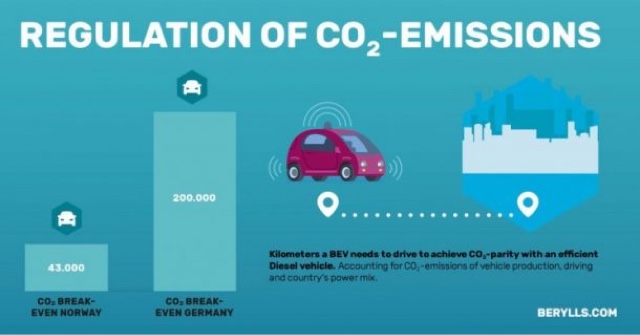In the last few years, electric vehicles have seen a significant rise all over the world. It was such a big hit that the biggest automakers in the market started making plans to go electric. It is also expected that very soon, we can see a 100% switch from diesel cars to EVs.
One of the biggest reason to universally choose EVs is the environmentally friendly nature which is a much-needed trait these days. A German automotive consultancy Berylls Strategy Advisors, who describe themselves as ‘the only relevant top management consulting firm working exclusively for the auto industry’ is saying that EV might not be as eco-friendly as the industries think it is.
The electric cars do not release carbon emissions, but the problem lies in the production of their lithium-ion batteries. The energy required to make the cells result in a high carbon footprint. It is so high that the automotive experts have estimated that an electric vehicle in Germany would take more than 10 years to break even with an efficient combustion engine’s emissions.
Dr Jan Burgard, managing partner at Berylls said in a statement, “Electric cars appear to be the panacea and reduce emissions by 35 %. After all, electric vehicles do not emit any carbon dioxide while driving – at least that is a widely held opinion.”
Burgard further added, “However, from well to wheel, they do not improve the situation. After all, electricity generation – including for electric cars – is still strongly dependent on fossil fuels in many EU countries.
The climate does not care whether carbon dioxide comes from the exhaust pipe or whether it is released when lignite is burned to generate electricity or in energy-intensive battery production.” The study states that building a 500 kilograms EV car battery or bigger in a fossil fuel-powered factory will result in 74% more carbon emissions than producing a traditional vehicle. Burgard says that it is time to consider the diesel approach if the world wants to reach the environmental targets of 2030 EU CO2.
Burgard said, “I miss a technology-agnostic discussion of available solutions, which also includes the potential of the currently demonized diesel engine. We will need it to achieve the EU’s climate targets.” Several others are not convinced with the research report and have lashed it on Twitter.
People stated that the report is biased and is coming from the place from where the funding arrives. However, it is essential to consider the dirty process of making a battery and make appropriate adjustments accordingly. While energy companies are moving towards greener initiatives, producing a cleaner battery might also be possible soon.




No comments:
Post a Comment